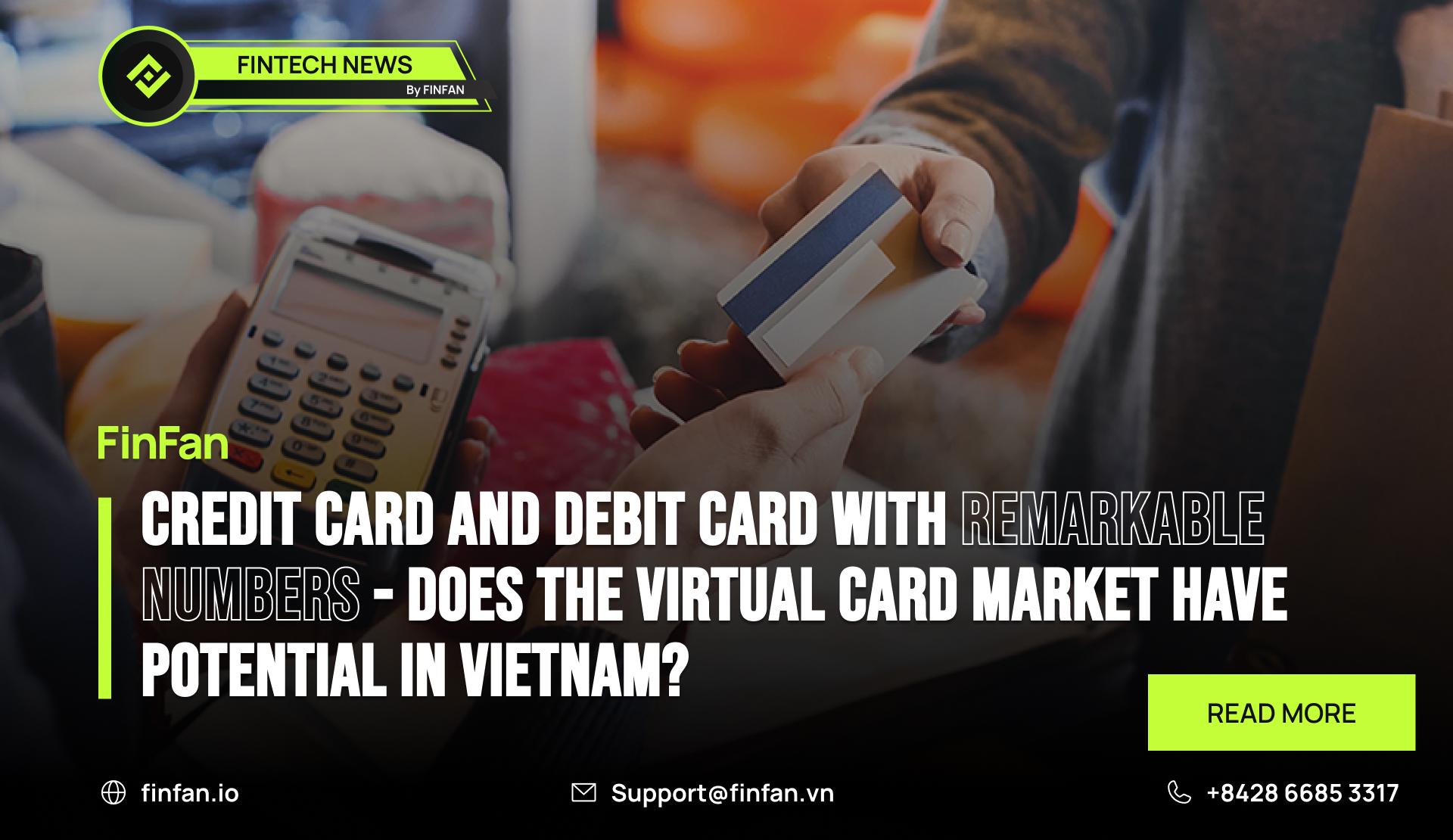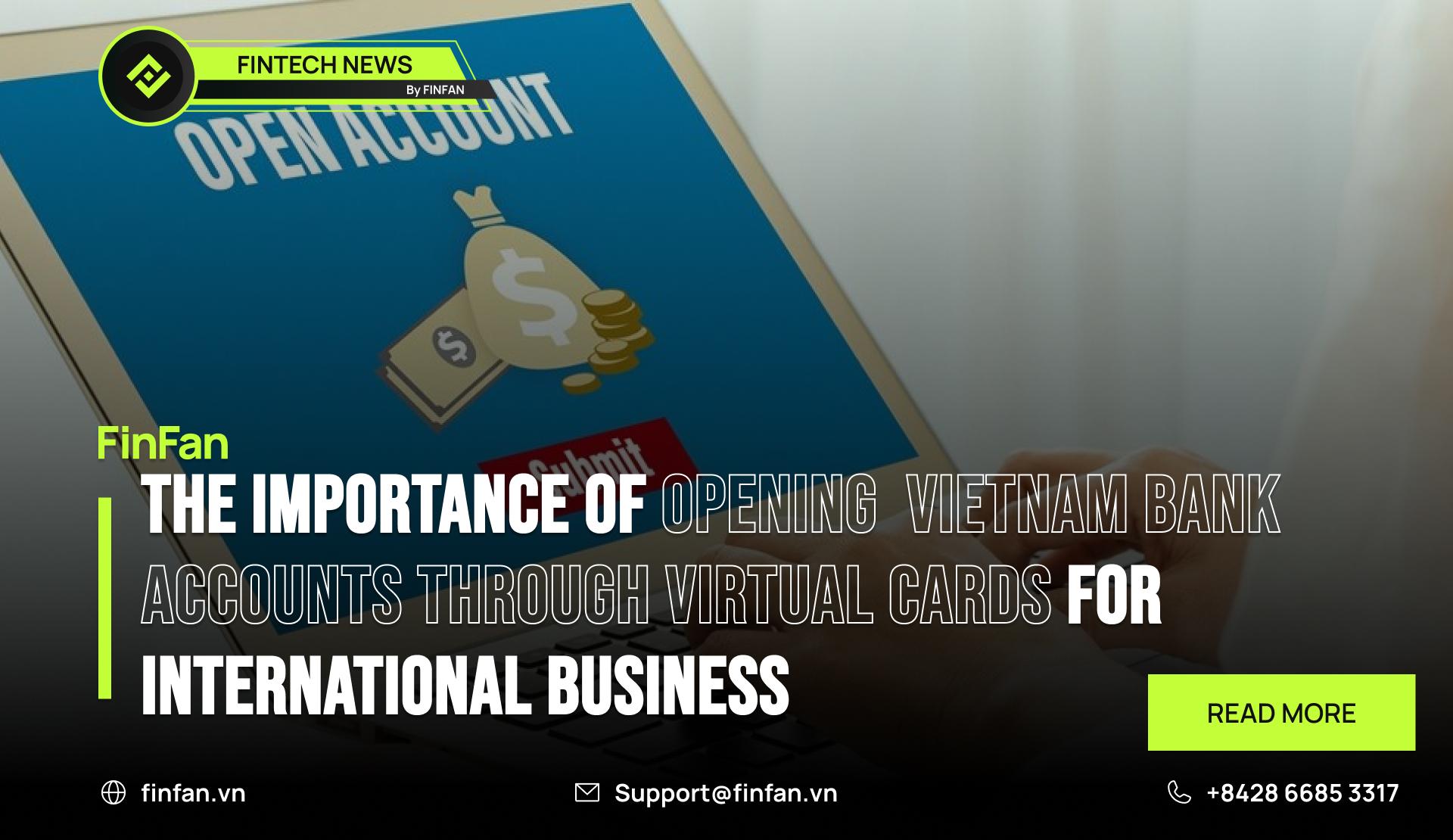Credit Card and Debit Card with Remarkable Numbers - Does the Virtual Card Market Have Potential in Vietnam

Recently, the unveiling of data by the Federal Reserve, as articulated by Research Director of the Financial Industry, Jack Caporal, in one of his articles, has revealed a remarkable surge in the utilization of both debit and credit cards within the United States.
The statistics elucidate that out of every ten individuals in the land of the Stars and Stripes, a staggering nine possess a debit card. At the same time, eight own a credit card, marking a notable trend toward financial inclusion and digital payment adoption. In his article, Jack Caporal also articulates his viewpoints regarding the significance of various types of bank cards in payment systems not only in the United States but also in other nations.
Thus, one may ponder whether credit cards and debit cards hold importance not only domestically but also across borders and whether the virtual cards market has potential in Vietnam. Let us delve into the following article together with FinFan to explore this matter further.
Credit and debit cards in the United States and Vietnam payment markets.
Some noteworthy parameters of credit cards and debit cards in the US parameters
According to Jack Caporal's article, the credit and debit card market in the United States is witnessing a vibrant evolution as:
-
133 million Americans - 52% of American adults have a Visa credit card, according to the Nilson Report.
-
-
110 million - 43% of American adults have a Mastercard credit card.
-
-
Discover and American Express lag behind with 49 million Americans - 19% of American adults have a Discover credit card while 44 million, 17% of American adults have an American Express credit card.
-
-
The purchase volume of general-purpose credit and debit cards in the United States in 2022 was $10.4 trillion, per the Nilson Report. That's up 11% from 2021. Credit cards accounted for $5.6 trillion while debit and prepaid cards accounted for $4.9 trillion.
Source: Fool.com
Some notable data about credit and debit card ownership rates in Vietnam
According to data on the card industry in Vietnam published in an article by VNEconomy in September 2023, there are 11 banks and 4 financial companies aggressively promoting the issuance of domestic credit cards.
By the end of August 2023, there were over 800 thousand domestic credit cards in circulation, marking a 42% increase compared to the same period in 2022.
Mr. Lê Anh Dũng, Deputy Head of the Payment Department (State Bank of Vietnam) also shared at the press conference announcing the series of Vietnam Card Day 2023 events organized by Vietnam National Payment Joint Stock Company (Napas) in collaboration with Tien Phong newspaper, by the end of July 2023, there were over 140 million payment cards in circulation nationwide. Among them, 103 million were domestic cards and 36.7 million were international cards.
Notably, nearly 10.8 million cards were opened through the electronic Know Your Customer (eKYC) identification method.
FinFan's comments on this development of the card payment industry in the two markets and globally
The reasons behind the increasing popularity of credit and debit card usage.
From the data above, it is evident that the demand for credit and debit cards among customers for payment is significant not only in Vietnam and the United States but also in other countries worldwide. This is due to several reasons:
- Convenience
Typically, individuals who use debit cards often receive their salaries from companies through this method (by transferring money into the employee's debit card account).
Therefore, after receiving their salary, they can immediately use this debit card and make payments for various everyday products or services without the need to carry a significant amount of cash in their wallets or purses.
This helps to mitigate risks associated with theft or misplacement of wallets or purses, as they are not required to carry large sums of cash with them.
- Security
With advancements in technology, credit and debit cards come with robust security features such as encryption, EMV chips, and fraud detection systems. Customers feel more secure using cards compared to carrying large amounts of cash.
- Globalization
In a society characterized by development and extensive international trade as it is today, owning an international debit or credit card offers significant advantages for both individuals and businesses in handling expenses and cross-border transactions. Especially with cards that provide multi-currency accounts, they serve as invaluable tools for seamlessly managing payments and bills with international implications.
For individuals, international debit or credit cards facilitate travel, online shopping from foreign merchants, and access to goods and services globally. They eliminate the need to carry large amounts of foreign currency or engage in currency exchanges, thus enhancing convenience and security during overseas transactions.
Similarly, for businesses engaged in international trade, these cards streamline payment processes, simplify expense management, and facilitate smoother cash flow management across different currencies. Additionally, they offer greater flexibility in handling supplier payments, conducting business trips, and managing operational expenses in various countries.
Moreover, international debit or credit cards often come with additional benefits such as travel insurance, purchase protection, and rewards programs, which further enhance their utility and appeal to both individuals and businesses engaged in global transactions.
Overall, the ownership of international debit or credit cards is instrumental in navigating the complexities of modern global commerce, offering efficiency, security, and flexibility in managing cross-border transactions and financial affairs.
- Digitalization
The shift towards digital payments is a global trend driven by technological advancements and changing consumer preferences. Credit and debit cards are integral to the digital payment ecosystem, enabling online purchases, mobile payments, and contactless transactions.
- Rewards and Benefits
Many credit cards offer rewards programs, cashback incentives, and other perks that incentivize card usage. Customers are drawn to these benefits and choose to use cards for their everyday transactions to maximize rewards.
Does the Virtual Card Market Have Potential in Vietnam?
Virtual cards offer several advantages that appeal to both consumers and businesses in Vietnam.
For consumers, virtual cards provide convenience, security, and flexibility in making online purchases and managing transactions without the need for a physical card. They also offer enhanced security features such as one-time-use card numbers, reducing the risk of fraud and unauthorized transactions.
Businesses can benefit from virtual cards as well. Virtual cards streamline the procurement process, allowing businesses to easily issue cards to employees for online purchases, travel expenses, and vendor payments. They also offer greater control and visibility over spending, with customizable spending limits and real-time transaction monitoring.
Moreover, virtual cards align with Vietnam's push towards a cashless society and digital transformation initiatives. As the government and financial institutions continue to invest in infrastructure and promote digital payments, the virtual card market is poised to expand further in Vietnam.
Conclusion
Overall, the widespread adoption of credit and debit cards underscores their importance in modern payment systems.
Furthermore, the ownership of international debit or credit cards is instrumental in navigating the complexities of modern global commerce, offering efficiency, security, and flexibility in managing cross-border transactions and financial affairs.
Finally, with the growing demand for digital payment solutions and the favorable regulatory environment, the virtual card market holds significant potential for growth and innovation in Vietnam.
The article was curated and authored by FinFan's market research and development team, alongside our marketing department.
About FinFan
FinFan is a cross-border embedded financial services company that focuses on mass disbursement, fund collection, card processing, IBAN, and digital APMs solutions, which can provide valuable input and integration on and for the same. FinFan already integrated with almost the world's well-known MTOs, PSPs, switch and core fintech platforms as Money Gram, Thunes, Qiwi, Remitly, World Remit, Bancore, PaySend, Terrapay, Ria Money Transfer (Euronet), Dlocal, Ripple, TripleA, FoMo Pay, Wings, etc. For more information, please contact us through:
🌐https://finfan.io
📞(+84) 2866 85 3317
✉ support@finfan.vn
LinkedIn: FinFan
Note:
Regarding a recent incident between FinFan and another technology service provider similar to ours here
We do not discourage any actions aimed at seeking ideas for articles. However, if there is any use of images or content related to FinFan's channels, please include the hashtag #finfanio or link to the article on the page or indicate (Source/Nguồn: FinFanIo) in the article used. Our media channels include:
. Website: FinFanIo
. LinkedIn: FinFanIo
. Facebook: @FinFanIo
. Twitter/X: @FinFanIo
. Google News: FinFanIo
... and other FinFan media channels.





